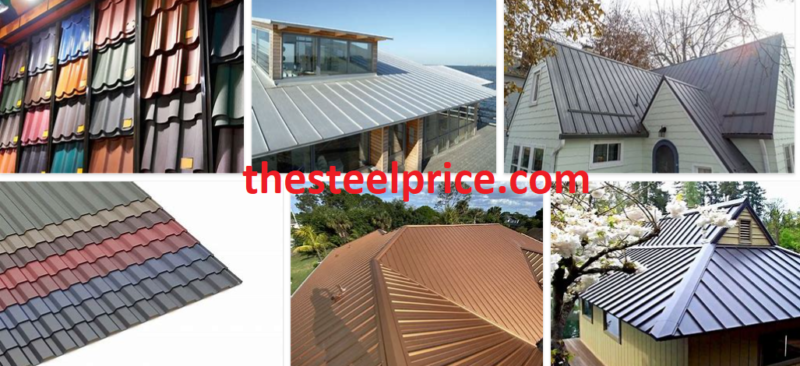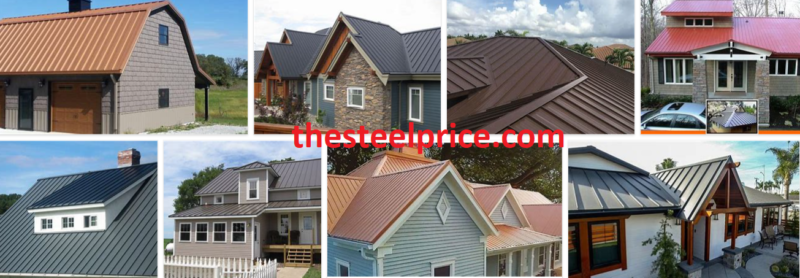Rust resistant
There are many advantages to a steel roof. First of all, a Steel Roof Colors is lightweight, durable, and has great corrosion resistance. This makes it an excellent choice for the vast majority of roofing applications, both value-oriented and traditional. This article will discuss the advantages of a Steel Roof Weight Calculation and give you a general idea of what to expect from a steel roof. Here’s a look at some of these benefits.
Rust resistant
For most residential buildings, steel will be used in panels. Most metal roofs will be composed of 26- or 24-gauge steel. The heavier gauge steel will cost 25% to 40% more than the lighter gauge. For the finish, most roofs will be coated with SMP or PVDF paint, depending on their intended use. The latter is less expensive, but will wear out faster than the former. A good choice for a residential roof is a 26- or 29-gauge panel.
Choosing the right material for a roof is critical. While steel is durable, it does have its pros and cons. Aluminum panels are often thinner than other types of metal, making them less flexible. In addition, aluminum is cheaper than other metals. It is also less dense, meaning it’s easier to bend. As a result, it will be lighter than other metal roofing materials. If you’re looking for a metal roof, be sure to choose the right gauge for your home.
When choosing a metal roof, it’s important to decide on the material thickness. It’s best to choose 26- or 24-gauge steel panels for residential applications. For industrial applications, it’s better to choose thinner-gauge steel. Then again, if you’re looking for a more durable roof, you might want to consider 24 gauge. These are the lightest and sturdiest metals.
Metal roof calculation
Metal weights are important when choosing a metal roof. Ideally, you’ll choose a steel with a thickness between 26 and 28 gauge. However, if your roof has a higher-quality finish, you can opt for a thinner-gauge steel. If you’re looking for a lighter-gauge, you can choose an aluminum roof. A typical aluminum roof has a coating that protects from the elements.
Choosing a metal roof
Rust resistant roofs are an excellent option for coastal areas. These types of roofs are durable and resist rust and are highly resistant to water. Although there are disadvantages to steel, it’s an excellent choice if you live in an area with a salty climate. The downside of steel is that it is relatively noisy, which may affect your ability to hear it. This is not an issue if your home is located in a coastal area.
Rust resistant roofs are an excellent choice for coastal areas. They are known to be very durable, and can resist corrosion for decades. They are also an excellent choice if you live in a salty area. In addition, stainless-steel roofs are a good choice for a home with high-salt exposure. The material is also aesthetically pleasing, and they can match other types of roofing.
Rust resistant roofs are more durable than other types of roofing. They are resistant to rust and corrosion, and are ideal for homes in a coastal area. Stainless-steel roofing systems are typically priced far lower than other types of metal roofs. Unlike other types of metal roofs, steel roofs are also less expensive than their copper counterparts. Aside from their durability, they are also more attractive.
The cost of a Steel Roof Weight is significantly lower than that of other roofing materials, but they are also more expensive than most other types. In addition, the quality of steel roofing is very high, and it can last for up to 200 years. Stainless steel is the most common type of metal roofing material and has an advantage over other types. Its durability is another advantage of using it. It is more affordable than other metals, and it can be more versatile.
Metal roofs are durable and cost-effective. They do not corrode. Compared to other types of roofing materials, steel is the least expensive. Because steel is cheaper than aluminum and zinc, it is more widely available. There are three primary types of steel: galvanized steel, weathering and bare steel. The first one is called galvanized. It uses zinc to protect the inner layer of steel from corrosion. This type of steel is an excellent choice for dry climates and coastal areas.



